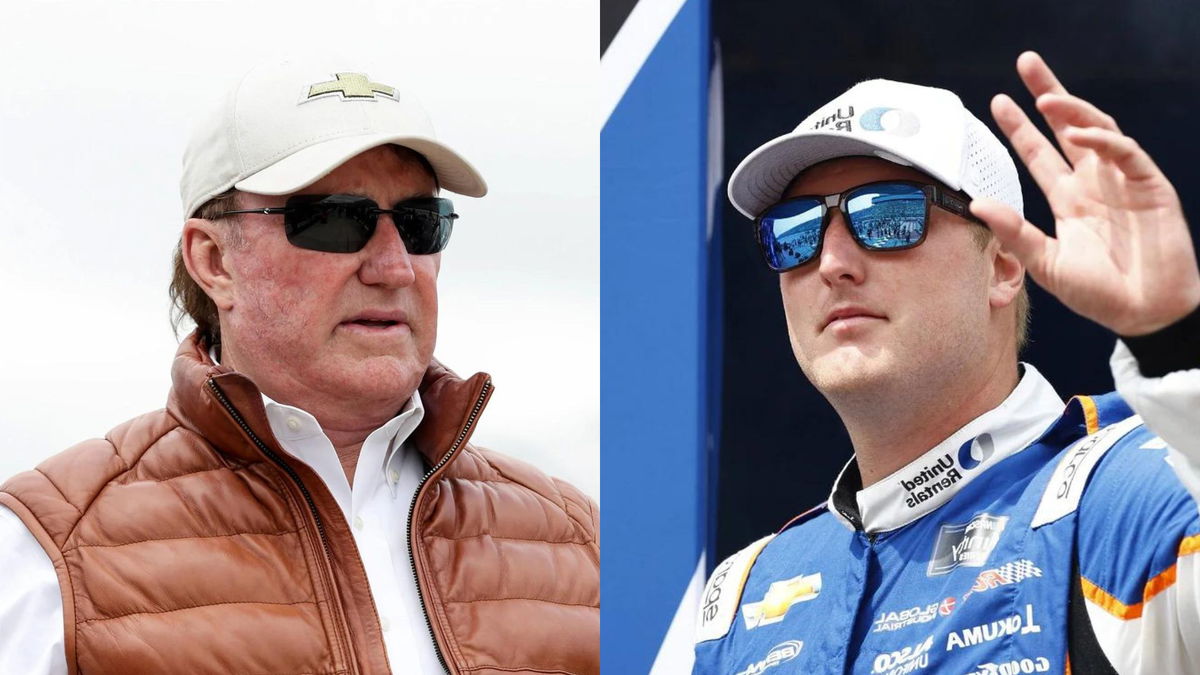
Imago
Richard Childress and Austin Hill | Image Credits – Imago

Imago
Richard Childress and Austin Hill | Image Credits – Imago
A sharp gasp rippled through pit road at Indianapolis as Aric Almirola’s battered car slammed violently into the wall, a chilling reminder of how quickly things can unravel in the Xfinity Series. Moments earlier, the race had been a typical mid-pack scramble, until a sudden right-rear hook from Austin Hill turned routine into chaos. Crew members craned their necks, officials scrambled with radios blaring, and drivers huddled in hushed clusters, eyes fixed on the replay monitors. But as the dust settled and tempers flared, the wreck turned into more than a racing incident. NASCAR insiders demanded serious action against Hill, despite Richard Childress’s public defense. The fallout has now overshadowed the crash itself.
Watch What’s Trending Now!
In the aftermath, emotions ran high both on and off the track. Almirola, shaken but thankfully uninjured, emerged from the infield care center with pointed words. Hill, meanwhile, stormed back to his hauler, frustration simmering. As the garage buzzed and penalty talk intensified, one thing was clear: this wasn’t just another “racing deal.” It was the kind of moment that forces NASCAR to reexamine where the line between aggressive racing and outright recklessness should be drawn.
Demands for Austin Hill’s suspension grow
Veteran NASCAR journalists Jeff Gluck and Jordan Bianchi didn’t hold back in the wake of the Xfinity Series chaos at Indianapolis. Their verdict on Austin Hill’s move against Aric Almirola was unequivocal: this wasn’t hard racing, it was, in their eyes, a deliberate act of retaliation. “How is that not intentional?” Gluck asked rhetorically in a live discussion following the race. “He had white gloves, you can see… he lost his crap and wrecked him, right? I mean, is there any debate?”
Bianchi backed the sentiment completely, stating he believed there was “no debate” about Hill’s intent. At the heart of their concern is a specific and dangerous maneuver, which is known as a right-rear hook. Jeff explained during the live discussion, “He (Austin) sounded pretty adamant about it, and you know, and I get Richard Childress trying to defend him, but to me, the only question is one race or two, not zero or one, because that was a particularly egregious right rear hook.” This type of contact, where a car intentionally clips the right rear of another vehicle at high speed, often results in the hooked car being turned headfirst into the wall.
Jeff Gluck spelled out why this wasn’t just a racing incident gone wrong. “That was a particularly egregious right-rear hook,” he said, noting it happened “on a high-speed track” and “into a non-SAFER covered wall.” For many insiders, this wasn’t just a question of a penalty, but how severe that penalty should be.
NASCAR has updated its rules to enhance accountability regarding playoff eligibility. Now, a driver suspended during the season loses all regular-season playoff points, crucial for postseason success. Hill, with 21 playoff points, risks a significant loss if penalized.“It’s gonna be very costly,” Gluck warned, highlighting the strategic blow this would deliver to Hill’s championship run.
What makes this all the more consequential is that Hill is not a fringe driver scraping for relevance; he’s been one of the Xfinity Series’ most consistent front-runners this season. That level of success makes the situation even more fraught, as Bianchi pointed out: “He’s a championship contender… and everything that goes along with it is now out the window.” Commentators discussed the implications for NASCAR’s disciplinary consistency, highlighting contrasts with previous cases like the contentious call involving Austin Cindric at COTA, which had less severe safety concerns.“You don’t do that at Indy,” Bianchi stressed. “It’s too fast, too dangerous… I have no issue with him being suspended.”
Gluck put it plainly: “I don’t even know that it’s worth trying to defend.” The scrutiny heightens as this incident stands out in the sport’s history. Hill’s glove position in the footage sparked claims of intentional steering, with Almirola’s strong post-race comments amplifying the message that this action crossed NASCAR’s line. NASCAR now faces significant concerns about driver safety, playoff integrity, and enforcement consistency. The sporting community is closely monitoring how NASCAR addresses accountability in these key issues.
Austin’s frustration, Aric’s allegations, and Richard Childress’s defensiveness
Richard Childress, the venerable owner of Richard Childress Racing, has taken a firm and vocal stand against suspending Austin Hill following the controversial incident at Indianapolis. When asked directly whether Hill should sit out upcoming races, Childress answered, “Hell no. They didn’t do a damn thing to the 2 car [of Austin Cindric] when he wrecked Ty [Dillon] and admitted to it,” Childress said, via Dustin Long of NBC Sports. “Drove him in the right rear and wrecked him at COTA. It’s who you are. We’re a blue-collar team, they give us trouble all the time.”
The defense has sparked mixed reactions in the NASCAR community. While Childress supports his driver, some question the fairness of his stance following Hill’s right-rear hook crash. Hill was passionate in defending himself, claiming he was trying to save the car and that the contact was not intentional. And when he was informed of NASCAR’s penalty, the Xfinity veteran radioed back to his team: “Oh, they can go f** themselves. F* NASCAR. That is f** bulls* … I’m f*** sideways, I go to correct it back to the left. It’s locked to the left, and I run into the #19 [Almirola].”
Other drivers and insiders have expressed concern over Hill’s actions and the precedent they set. Aric Almirola, the victim of Hill’s maneuver, described the hit as one of the hardest in his career and said, criticizing Hill, “Oh, it was definitely intentional. He blocked me three times, and I finally got him loose into (Turn) 3. He had damage on the nose, so he was really slow in the corners. It was time to go. We’re coming down to ten laps to go, and the leaders are starting to put a gap on us. It’s time to go. I got him loose, and he just turned left and hooked me in the right rear. Honestly, one of the biggest hits in my entire NASCAR career. Very reminiscent of the hit I took when I broke my back.” This perspective underscores the growing demand for accountability beyond team loyalty.
NASCAR’s recent suspensions for intentional wrecking, involving drivers like Bubba Wallace and Chase Elliott, raise concerns about Austin Hill’s case. Many believe a suspension is necessary due to the incident’s severity and safety risks at high-speed tracks like Indianapolis. Richard Childress opposes this, citing team loyalty, while others in the community support strict penalties to uphold safety standards. The final decision will affect Hill, RCR, and NASCAR’s reputation for fairness.








